Not only did Apple release iOS 17.4 beta 1 with support for iPhone sideloading and everything else the DMA regulations forced Apple to change, but the iPhone vendor also detailed the new terms developers can sign for the region, including financial details and new commissions.
While iPhone sideloading is coming to the EU, developers can still stick with the current payment fee structure. That is, pay 30% or 15% (under the App Store Small Business Program) for digital purchases instead of the new commissions.
They can switch whenever they like if they want to offer app downloads directly to their customers via their websites or third-party app stores, which Apple refers to as app marketplaces.
The Digital Markets Act (DMA) is a piece of legislation that will make big changes to how tech works and is used in Europe. The new law will supposedly improve competition and protect the consumer. But when it comes to sideloading, a quick calculation indicates that apps aren’t going to be more affordable in Europe—at least, not all of them.
For some developers, sticking with Apple’s current scheme — the one they criticize so often — might make more sense than adopting the new EU-only contract.
The new App Store fees
Apple published extensive documentation for developers who sell digital content in Europe. That includes a breakdown of the new commission scheme that Apple is proposing. The alternative business terms for iOS, which I’ll call the DMA terms for simplicity though the EU doesn’t impose them, have the following elements:
Reduced commission — iOS apps on the App Store will pay a reduced commission of either 10% (for the vast majority of developers, and for subscriptions after their first year) or 17% on transactions for digital goods and services, regardless of payment processing system selected;
Payment processing fee — iOS apps on the App Store can use the App Store’s payment processing for an additional 3% fee. Developers can use a Payment Service Provider within their app or link users to a website to process payments for no additional fee from Apple;
Core Technology Fee (CTF) — For very high volume iOS apps distributed from the App Store and/or an alternative app marketplace, developers will pay €0.50 for each first annual install per year over a 1 million threshold. Under the new business terms for EU apps, Apple estimates that less than 1% of developers would pay a Core Technology Fee on their EU apps.
Put differently, developers will pay 10% (+3% for Apple’s payment processor) or 17% (+3% for Apple’s payment processor) on all digital transactions from the App Store.
They’ll pay no commissions for sideloading, including third-party app stores, if they also get a third-party payment processor. Otherwise, a 3% Apple fee would be applied.
Finally, if their apps are so popular they’re downloaded more than 1 million times in 12 months, they’ll pay €0.50 ($0.54) for each first download after that first million.
Complicated, right? Luckily, Apple has a fee calculator in place you can use to see how much you’d pay in fees to Apple if you avoid the App Store in the EU.
The calculator
You might have seen this tweet from Nikita Bier the other day that shows you the following example: A developer who expects to make $10,000,000 a year from 10 million installs will pay nearly $6.2 in fees. Bier was appalled, and for good reason.
But his example isn’t thorough enough. There are multiple choices in that calculator, so let’s explore every option.
First, let’s remember that Apple lets you keep the current 30% / 15% fee structure in place and ignore the DMA terms. That’s something Bier fails to mention. Let’s look at all the scenarios using the exact same example he provided: $10,000,000 in revenue for a year after 10 million app downloads.
App Store commissions the old way
Today’s capabilities and terms with App Store Small Business Program: $125,000 monthly fees or $1.5 million a year:
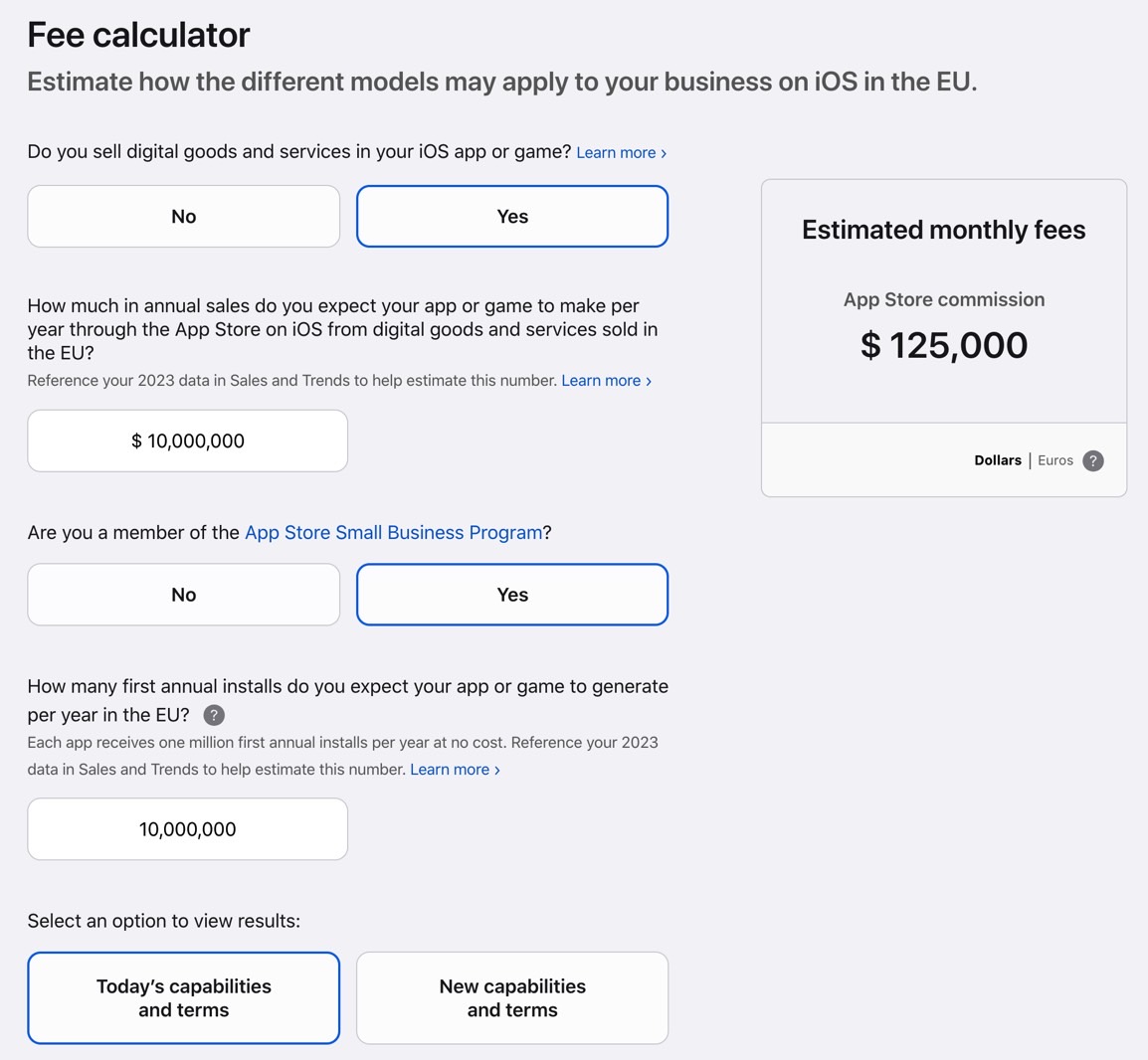
Today’s capabilities and terms without App Store Small Business Program: $250,000 monthly fees or $3 million a year:
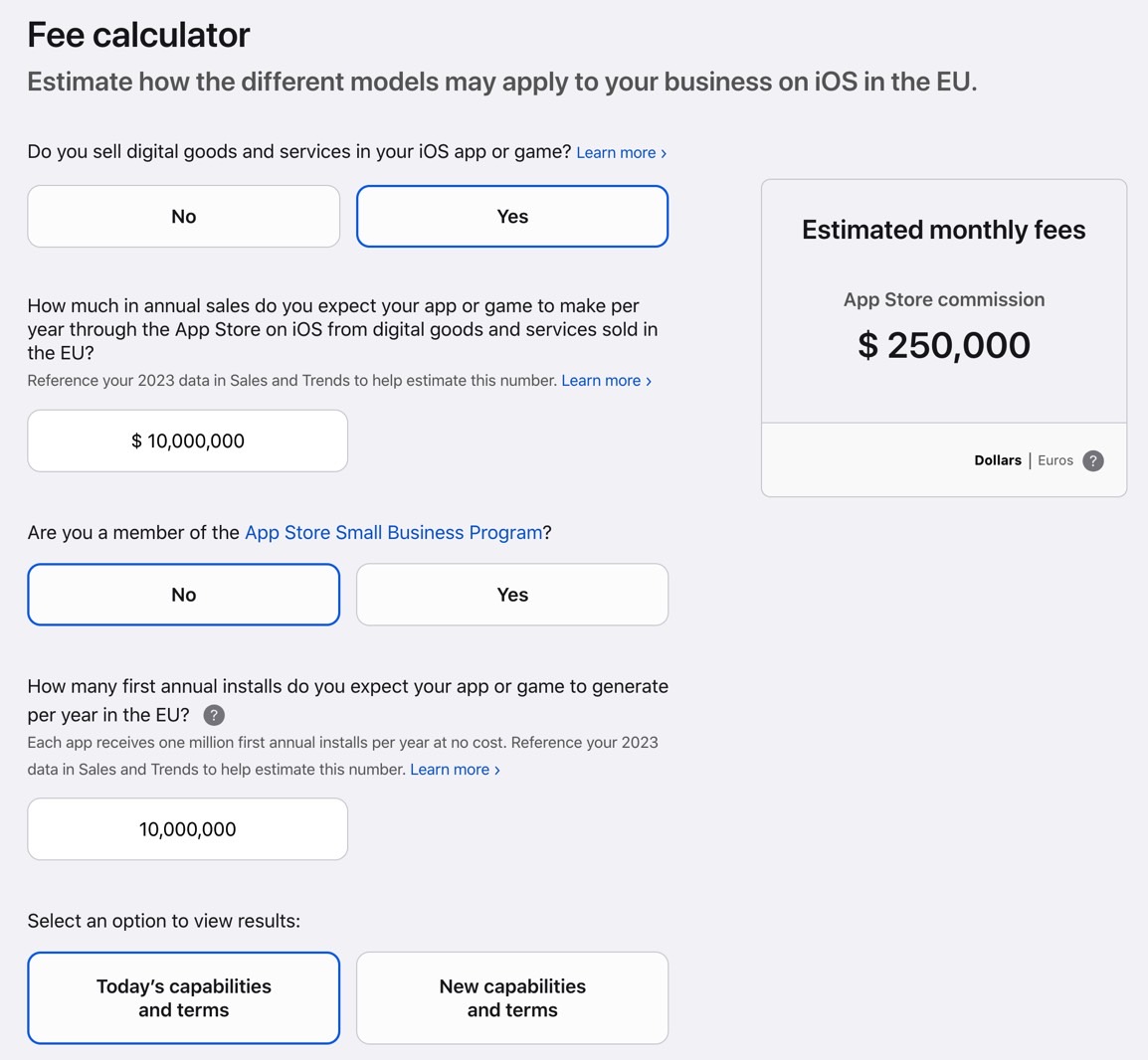
These are the only options. So let’s look at how Apple’s fees will vary if you go for sideloading, third-party app stores, third-party payment systems, etc.
App Store commissions the DMA way
New capabilities and terms with App Store Small Business Program and App Store fees with In-App Purchases: $515,942 monthly fee or $6.19 million a year:
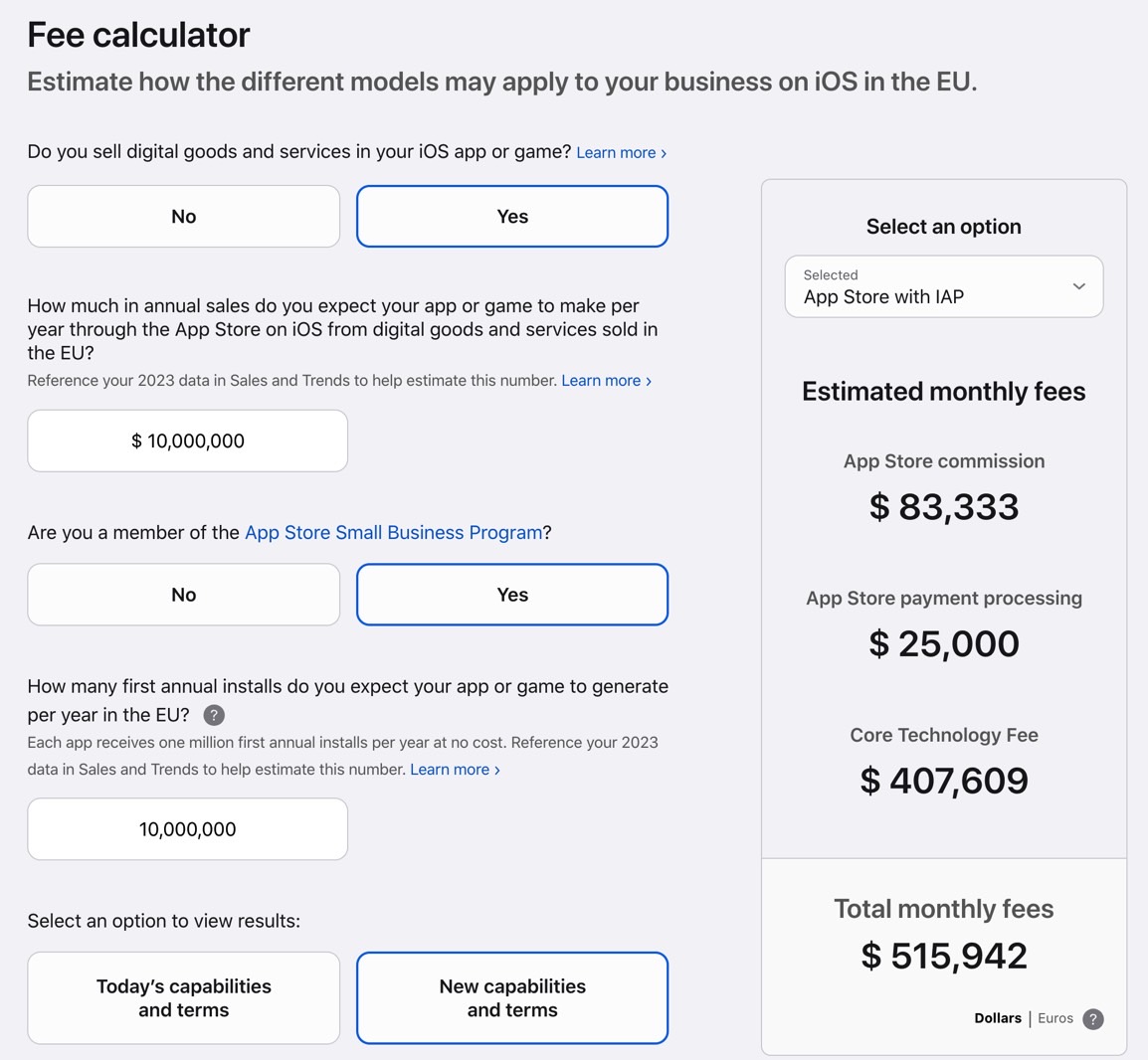
New capabilities and terms without App Store Small Business Program and App Store fees with In-App Purchases: $574,276 monthly fee or $6.89 million a year:
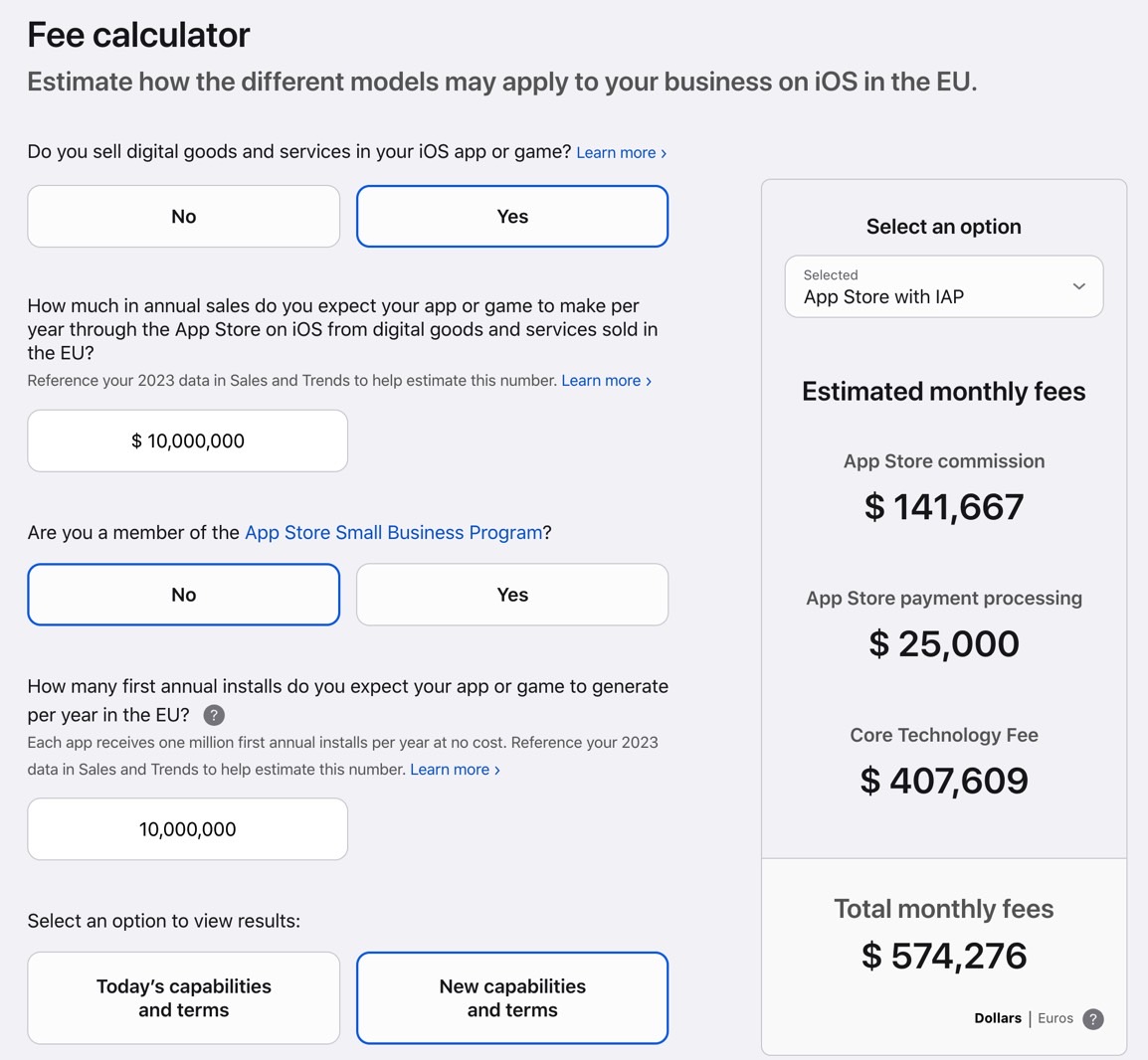
New capabilities and terms with App Store Small Business Program and App Store fees with alternative payments: $490,942 monthly fee or $5.89 million a year:
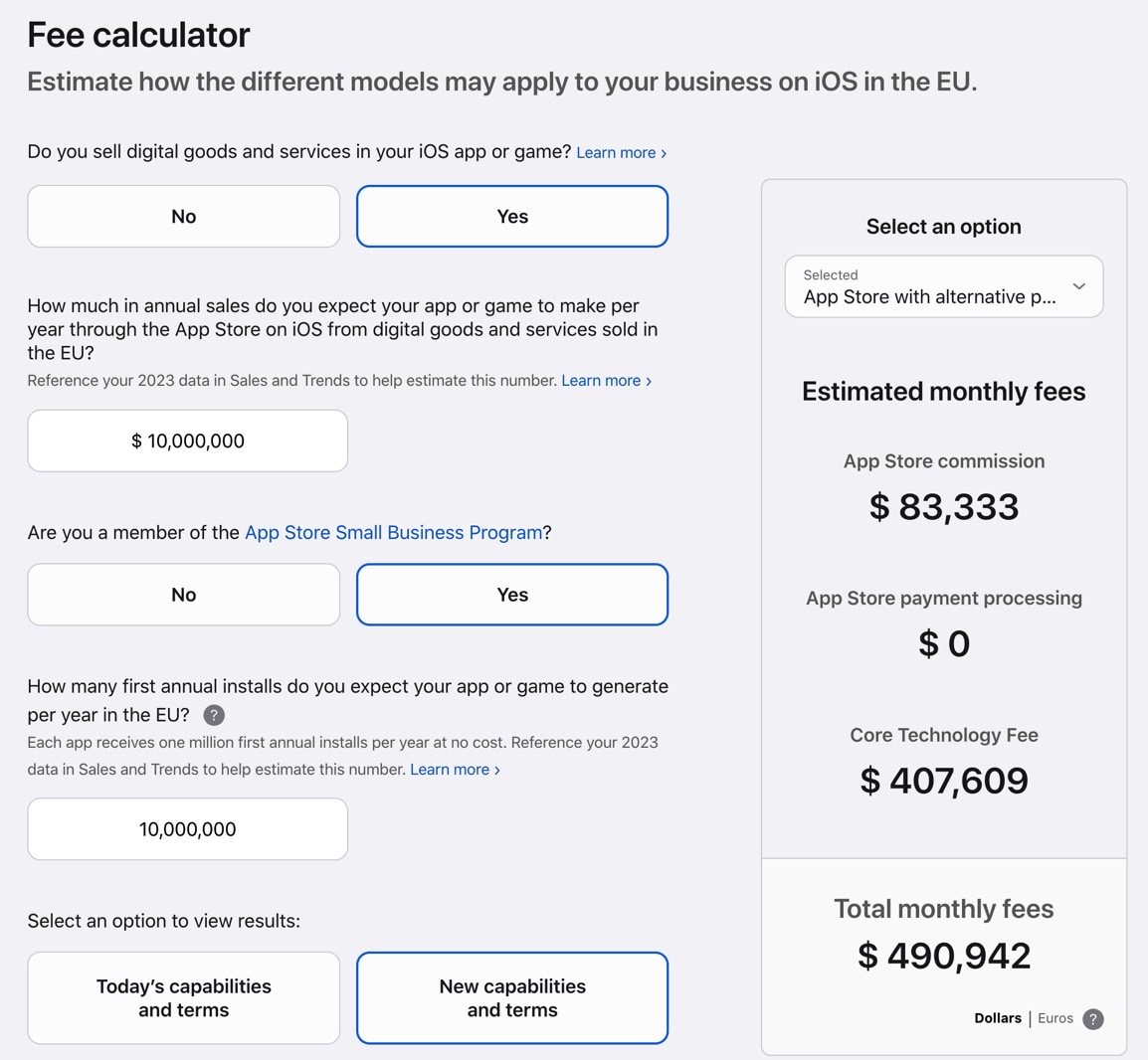
New capabilities and terms without App Store Small Business Program and App Store fees with alternative payments: $549,276 monthly fee or $6.59 million a year:
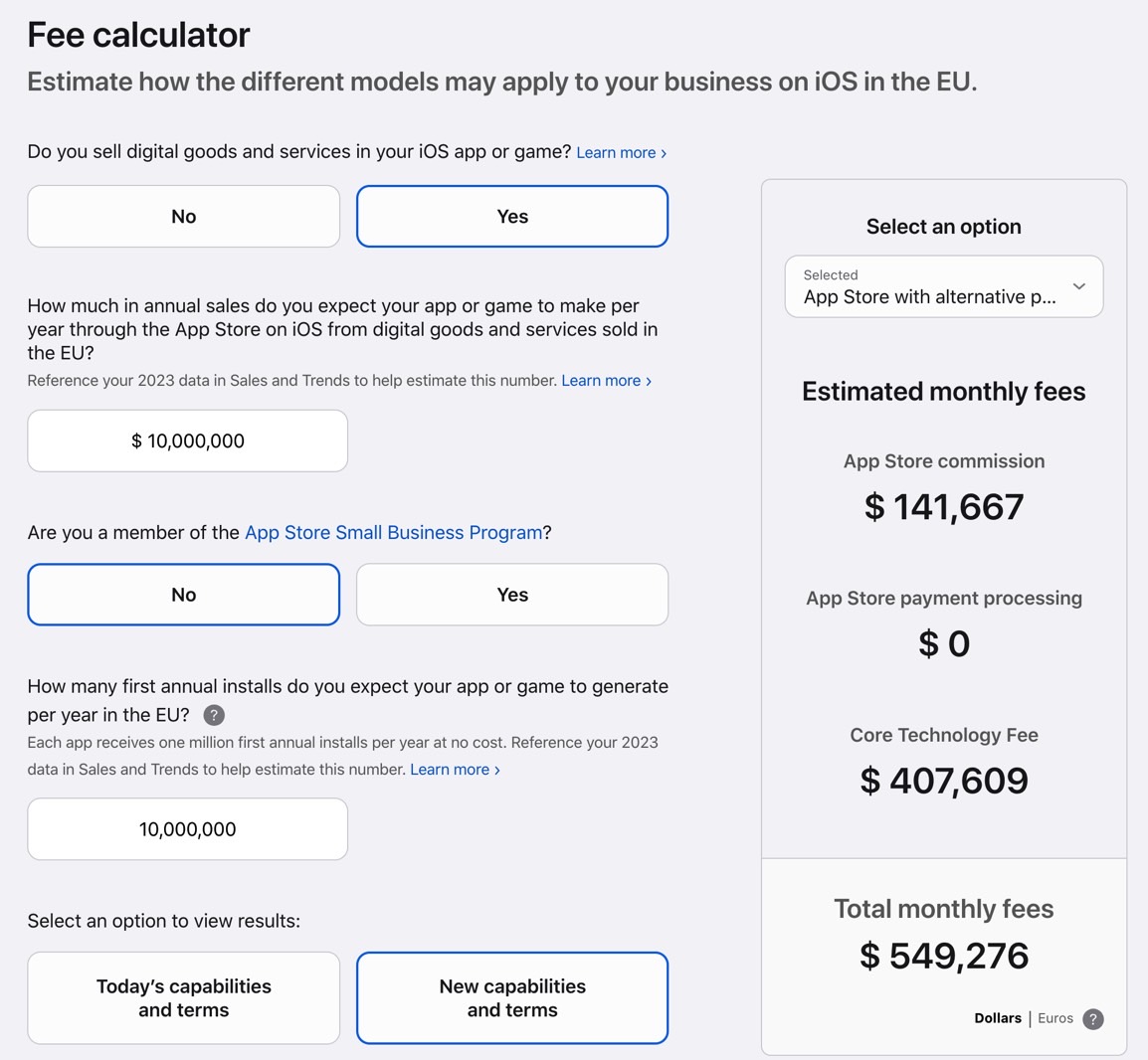
New capabilities and terms with App Store Small Business Program and alternative providers only: $407,609 monthly fee or $4.89 million a year (does not include commissions to third-party stores and payment providers):
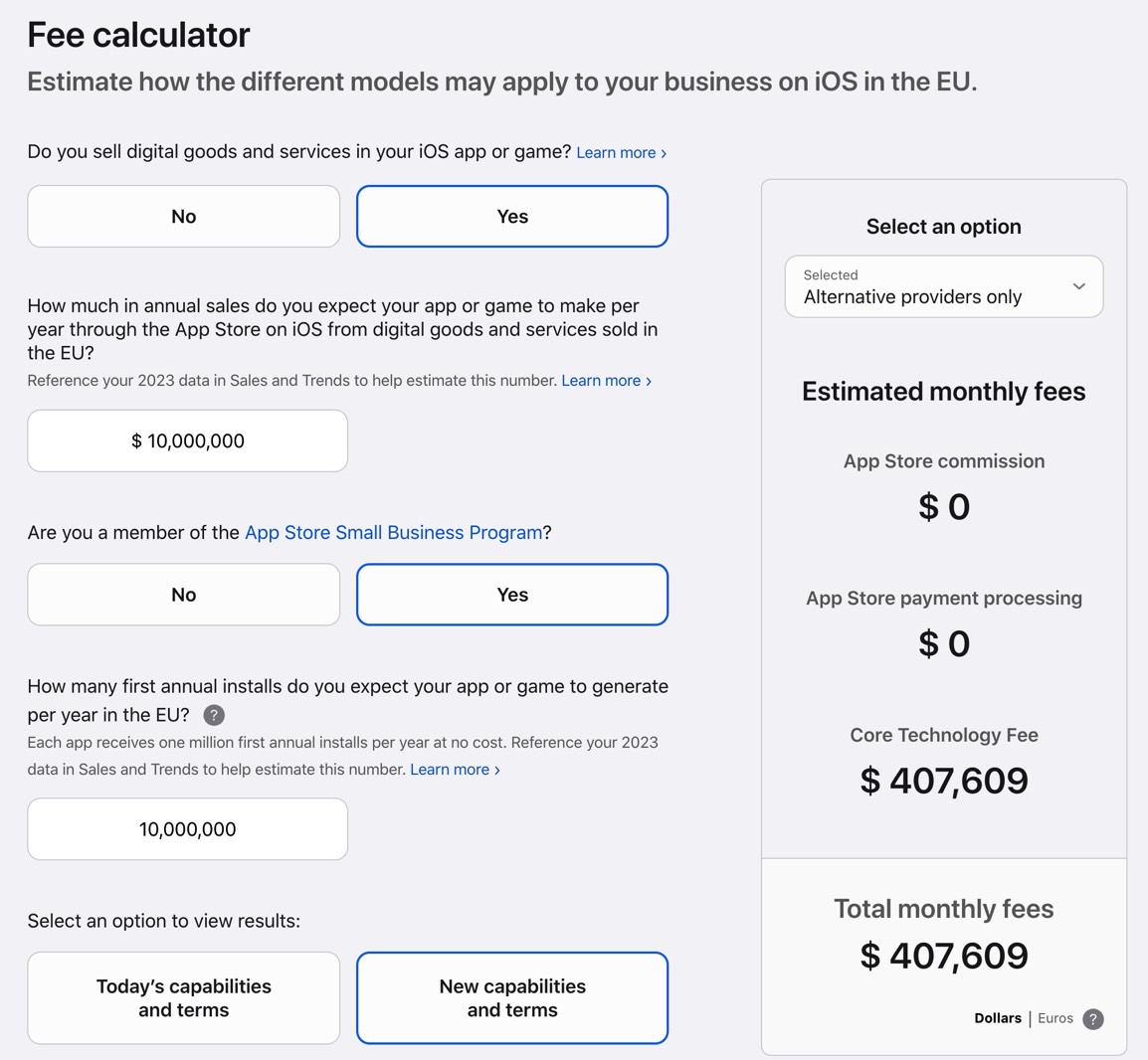
New capabilities and terms without App Store Small Business Program and alternative providers only: $407,609 monthly fee or $4.89 million a year (does not include commissions to third-party stores and payment providers):
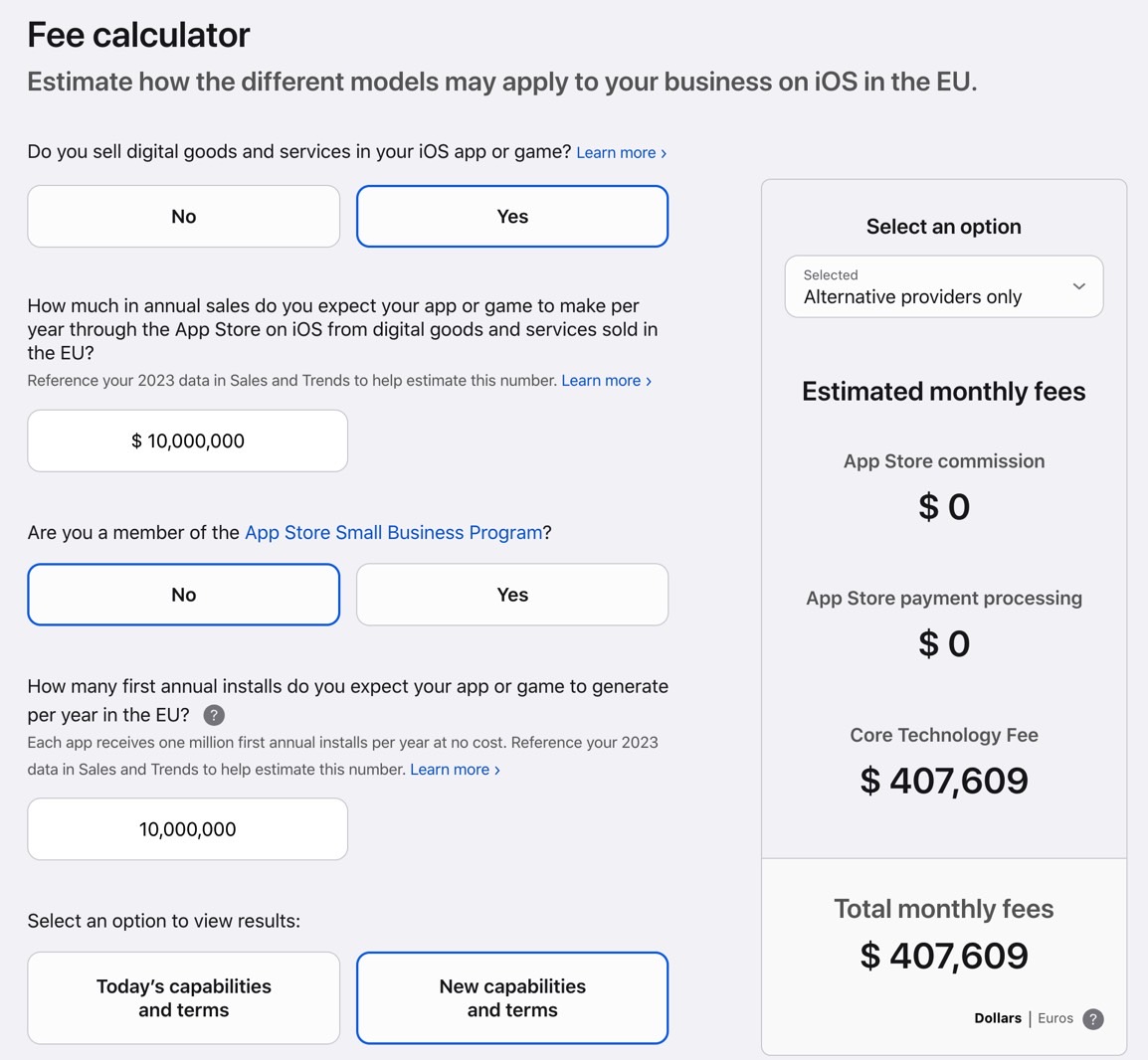
New capabilities and terms with App Store Small Business Program and 50% App Store with In-App Purchases, and 50% alternative marketplaces and payments: $461,776 monthly fee or $5.54 million a year (does not include commissions to third-party stores and payment providers):
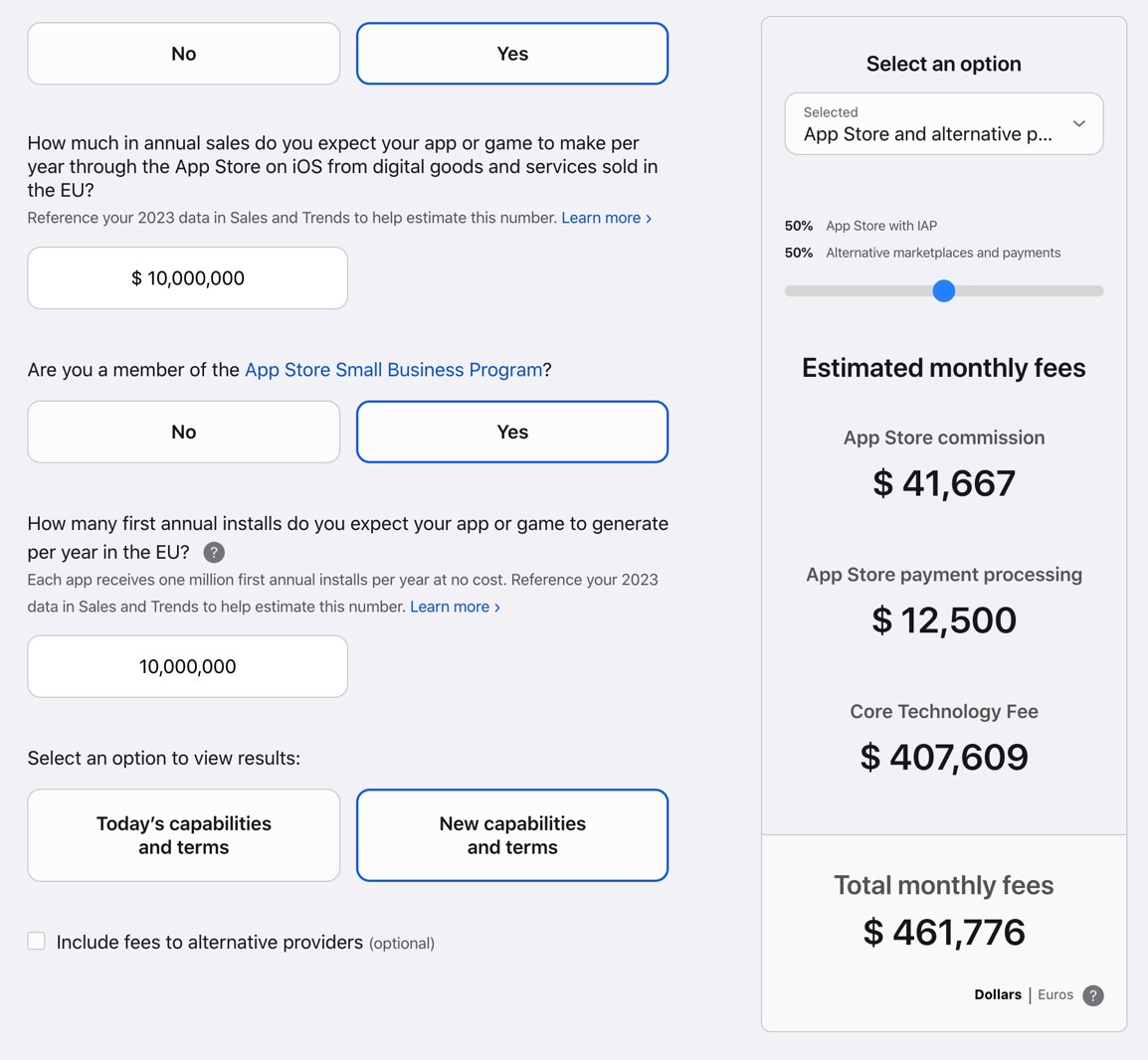
New capabilities and terms without App Store Small Business Program and 50% App Store with In-App Purchases, and 50% alternative marketplaces and payments: $490,942 monthly fee or $5.89 million a year (does not include commissions to third-party stores and payment providers):
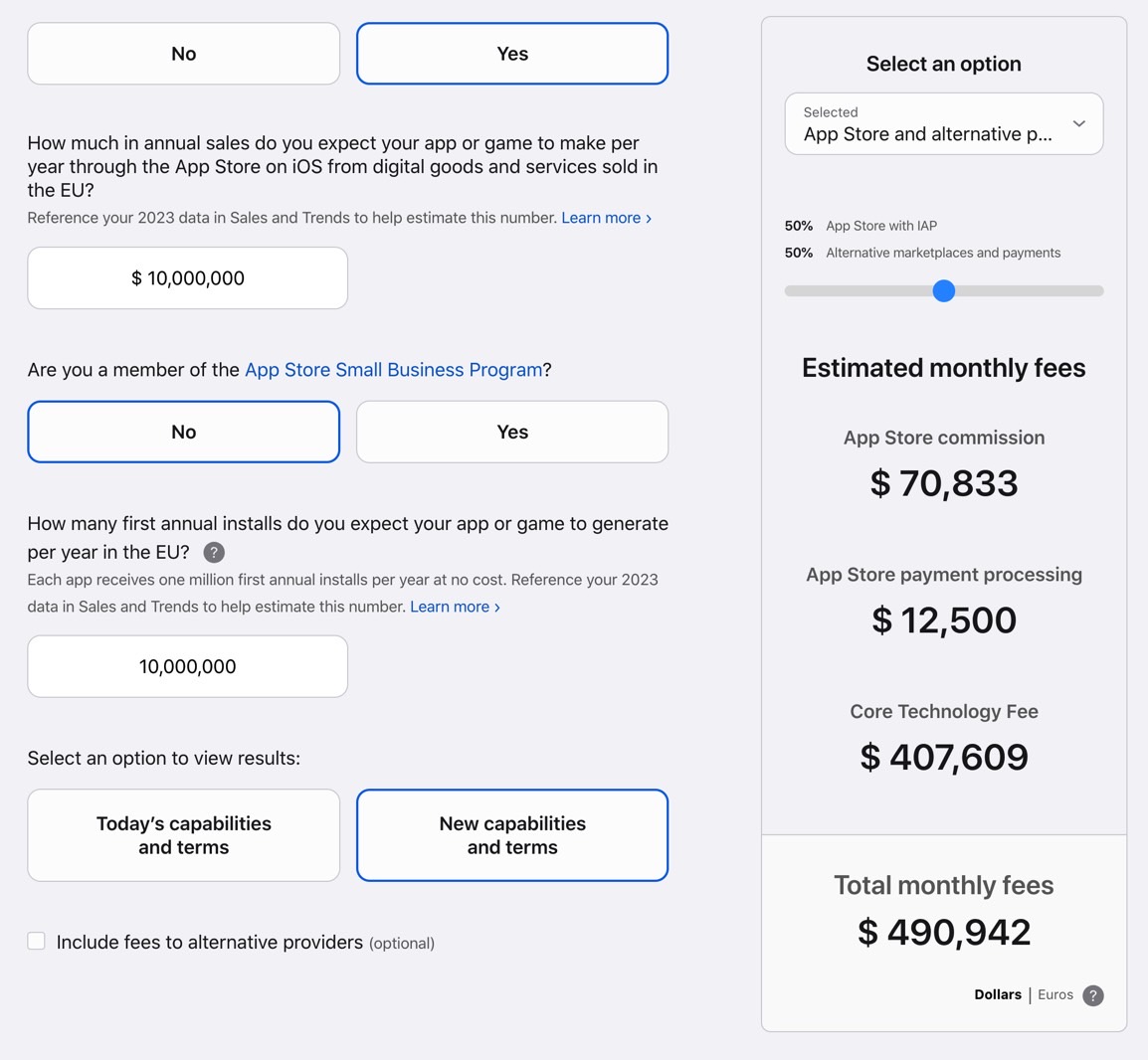
Bottom line
According to Apple’s calculator, iPhone sideloading will not decrease prices. If anything, developers will pay even more money to Apple than what they’re paying now. That doesn’t include costs related to operating their own app marketplace, a third-party payment processor, and customer care-related costs.
Back to Nikita Bier’s tweet, the screenshots above show that the $6.2 million yearly fee scenario isn’t even the worst. But they also prove that Apple’s current App Store terms are much better deals. Maybe he would pay $3 million instead of $6.2 million in fees.
I’ll also point out one way to go for third-party app stores and third-party payment systems that will improve the figures in the developer’s favor. You increase the price of the app. So instead of getting $10,000,000 in revenue from 10,000,000 installs, you aim for $20,000,000 or $30,000,000.
That’s $2 or $3 per app instead of $1. The higher the figure, the better the deal for the developer. Apple’s fees do not increase significantly because the Core Technology Fee won’t change as the number of downloads stays in place in these examples.
However, Europeans would have to pay more for apps, not less, as some might be dreaming of.








